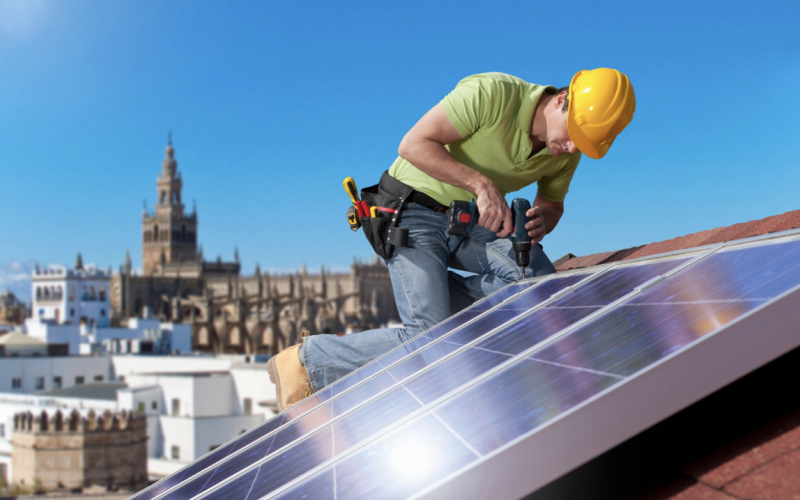Do you want to take control of your energy costs?
For many homeowners across the US, switching to solar energy is easier than ever. A whole host of economic factors make it smart for homeowners to switch. Perhaps most importantly, solar energy systems are now a more attractive choice than they’ve ever been.
If you’ve been thinking about switching to solar, you may still have some questions that need to be answered. For instance, what’s involved with these systems? How do you choose the right one for your home?
Curious to learn more? If so, you’ve come to the right place. Below, we’ll provide a brief beginner’s guide to everything you need to know about solar energy systems. That way, you can make the best choice for your family’s future.
Photovoltaic Cells
Photovoltaic, or PV, cells are the most common type of solar energy system. They use the sun’s rays to generate electricity. PV cells capture the sun’s energy through a two-step process.
First, they absorb light and convert it into direct electric current (DC). Then, they convert the current into alternating current (AC) for households and businesses. Solar energy systems and PV cells enable people to generate electricity from the sun, reducing or eliminating their electricity costs.
Energy Production
Solar energy systems take energy from the sun and turn it into something useful, usually electricity. Then, this energy can be used for many things, like heating, cooling, lighting, and running appliances.
You can also use solar energy systems to store energy for later use. This means that less energy from other sources is needed. So what are you waiting for? You should make the switch to solar today!
System Sizing
System sizing of the solar energy system is a process of determining the appropriate size of a photovoltaic system for a given environment. It considers the array size, the number of modules, and the appropriate number of charge controllers, batteries, and solar panels.
System sizing is also important in providing adequate space for the hardware, accounting for losses and overproduction, and providing a compatible interface with the electricity network. For a given size, there are several combinations of hardware and technology that you can use to create the right-sized system.
Cost
Solar energy systems cost different amounts of money based on how big the system is and how much solar energy is needed. In general, the size and effectiveness of a system make it more expensive.
Solar energy systems for homes can cost anywhere from a few thousand to tens of thousands of dollars. In contrast, systems for businesses can cost anywhere from several hundred thousand to several million dollars.
Installation costs are also something to think about. These vary depending on where you live and how complicated the system is.
Tax credits and other incentives can help pay for some of the costs of installation and infrastructure. This makes solar energy a good choice for people who want to cut their electricity costs over time and don’t want to spend much money.
Maintenance
Solar energy systems need to be taken care of regularly to ensure they work as well as possible and last as long as possible. Most of the time, maintenance involves checking the system for faults or problems with how it works and cleaning and replacing key parts like inverters, batteries, and solar panel cables.
Depending on the type of system, other parts like trackers and mounting structures may need to be checked and fixed regularly to ensure they work correctly. Checking the direct current voltage, testing the system’s output, and keeping an eye on the temperature of the solar panel cells are all part of the maintenance process. You should also check the tracking and aiming of the solar panel array from time to time.
Environmental Impact
Solar energy systems are becoming increasingly popular because they are better for the environment than most other types of energy. Solar energy systems aren’t made by burning fossil fuels; they don’t put harmful gases into the air. This means that solar energy systems can help clean up the air and lessen the effects of climate change on the whole planet.
Solar energy doesn’t need a lot of land or water to work, which makes it better for the environment as a whole. Also, going solar doesn’t pollute the environment with waste or noise; they can help save resources by reducing the need for electricity from other utilities.
Net Metering
Net metering lets people connect a solar energy system to the traditional electric grid and “sell” back to the grid any extra electricity that the solar energy system doesn’t use. The homeowner will get a net metering credit from the utility company for the energy they send back to the grid.
This means they will be paid for the energy they send back to the grid, which is more than they use. This has made it possible to make more solar energy because homeowners are now more likely to buy energy-saving solar energy systems.
Building Codes and Zoning Regulation
Building codes are about safety and how things look, while zoning laws are about how land is used and things are built in certain areas. Governments usually have rules about how to build and use solar energy systems. If these rules are followed, it can help protect the environment, use solar power efficiently and safely, and make sure the system works right.
Building codes must cover important things like how to get permission, fire safety rules, solar systems, wiring, installation, and maintenance standards. Zoning rules must cover things like height limits, setbacks, slopes of the ground, and other installation-related limits. Your solar company should know all about this!
Learn Everything You Need to Know About Solar Energy Systems
Solar energy systems are an amazing energy source with numerous benefits. From being cost-effective and easier to maintain than other energy sources to reducing your carbon footprint, solar energy can help you save money and reduce your environmental impact.
Investing in a solar energy system today can make a difference in your energy savings tomorrow. If you want to reduce energy bills and lower carbon emissions, consider investing in a solar energy system today.
Did you find this article helpful? If so, be sure to check out our blog for more informative content like this.





